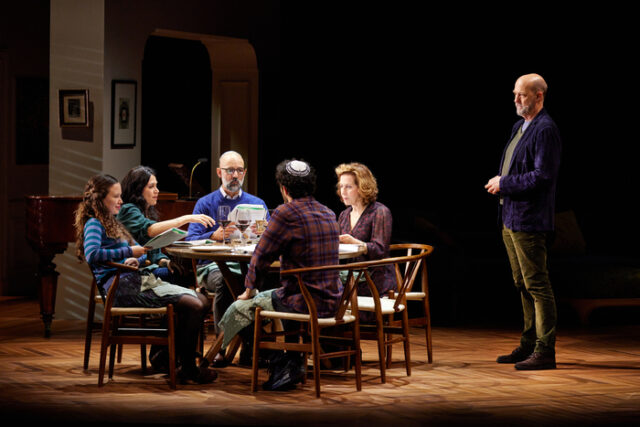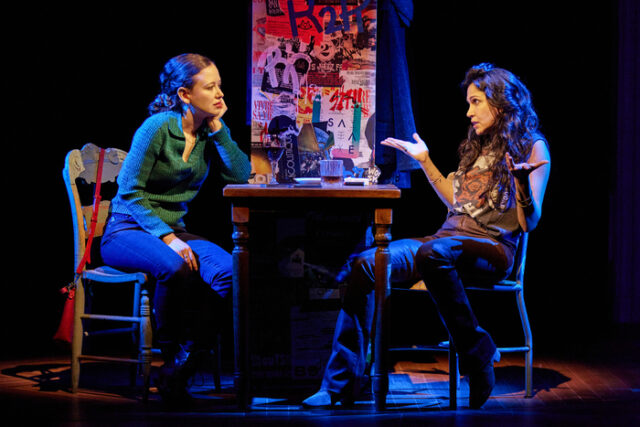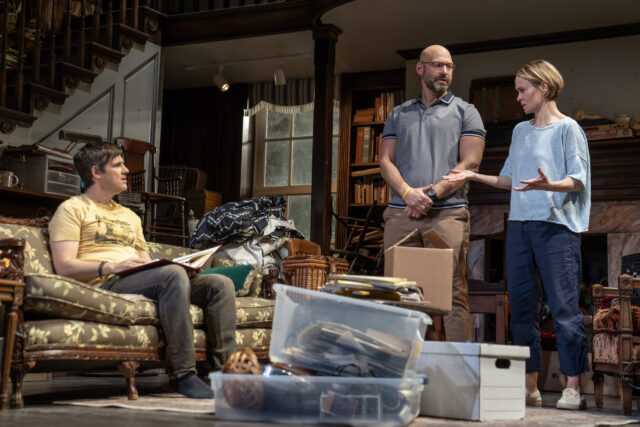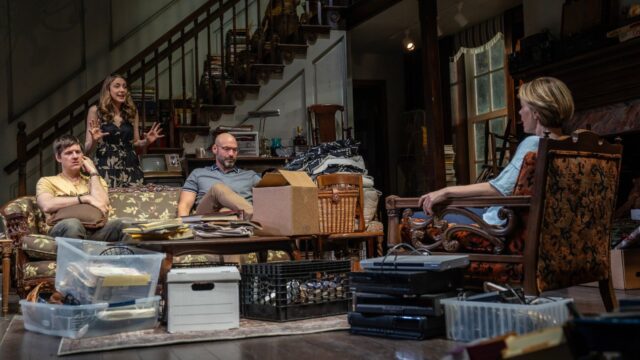
Two ancient women introduce the audience to Jordan Harrison’s The Antiquities at Playwrights Horizons (photo by Emilio Madrid)
A TOUR OF THE PERMANENT COLLECTION IN THE MUSEUM OF LATE HUMAN ANTIQUITIES or, just THE ANTIQUITIES
Playwrights Horizons, the Judy Theater
416 West 42nd St. between Ninth & Tenth Aves.
Tuesday – Sunday through March 2, $62.50 – $102.50
www.playwrightshorizons.org
“It’s alive, it’s alive!” a mad scientist cries out in the 1931 sci-fi classic Frankenstein, as he watches electricity breathe life into a creature made of stitched-together body parts from corpses. People have been searching for the fountain of youth essentially since the beginning of time, on an endless quest to defeat death and live forever.
Pulitzer Prize finalist Jordan Harrison traces that journey, focusing on our role in our own destruction, in A Tour of the Permanent Collection in the Museum of Late Human Antiquities or, just The Antiquities, an intensely clever and prescient warning shot that opened tonight at Playwrights Horizons, in a coproduction with the Vineyard and the Goodman.
Harrison (Marjorie Prime, The Amateurs) and codirectors David Cromer (A Case for the Existence of God, Tribes) and Caitlin Sullivan (Find Me Here, The Good John Proctor) lead the audience between 1816, when Mary Wollstonecraft Godwin shares a ghost story that would become her Gothic novel Frankenstein; or, The Modern Prometheus, and 2076, when AI has taken over in the postapocalyptic nightmare we all fear is coming.
The hundred-minute play begins with two women from the Museum of Late Human Antiquities surveying the audience, as if we are objects in a gallery.
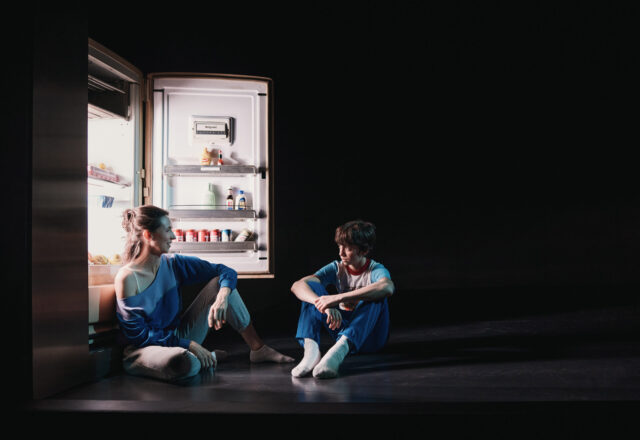
A mother and son contemplate death in Jordan Harrison’s The Antiquities (photo by Emilio Madrid)
Woman 1: “Thank you for coming.” That’s what we’d say, if we were them. Thank you for coming. It’s good to see your faces. Fasten your seatbelts. Look alive.
Woman 2: “Look alive.”
W1: That’s one of my favorites. As if it were necessary to pretend.
W2: [To the audience, trying it out.] Look alive.
W1: [Regarding us.] They do, don’t they. You all look perfect. It’s like we’re really here. [A beat. She takes in the room.] Imagine we’re actually here in these seats in this room in the Late Human age. Imagine you have a body. Imagine that’s your body.
Cindy Cheung, Marchánt Davis, Layan Elwazani, Andrew Garman, Aria Shahghasemi, Kristen Sieh, Ryan Spahn, Julius Rinzel, and Amelia Workman portray multiple characters throughout the centuries, with quick costume and set changes; the effective period dress is by Brenda Abbandandolo, while Paul Steinberg’s cold, metallic set shifts for every scene as props are added and subtracted, from a bar and a kitchen refrigerator to an early home computer and a conference room. In 1816, Mary, Percy Bysshe Shelley, Claire Clairmont, Dr. Thomas Briggs, and Lord Byron gather around a campfire and try to scare one another. Early on, Mary offers, “What if I could bring back the dead.” Mary’s mother died ten days after her daughter was born, and Mary suffered several miscarriages and lost three children after birth, so her desire to bring back the dead was deeply personal.
In 1910, a father drops off his ten-year-old son to work in a factory where he might lose a finger or two if he’s not careful. In 1978, Stuart has built a robot that can learn, on its way to being sentient. “It’s life. I created life,” he boasts to a bartender. In 1994, a family of three bask in the glow of their new computer and prepare to connect to the internet for the very first time, via a loud dial-up modem. “Did you ever think you’d live in the future?” the mother asks. In 2008, a young woman teaches her grandfather how to use his iPhone to access the World Wide Web. In 2023, a woman is offered a big payout if she agrees to an NDA to silence her complaints about out-of-hand technology at her firm. She argues, “Doesn’t anybody get it? I’m telling you I made this thing, I helped make this thing, and now . . . We’re the dinosaurs. We’re the dinosaurs and this is the meteor.”
And then, in 2076 . . .
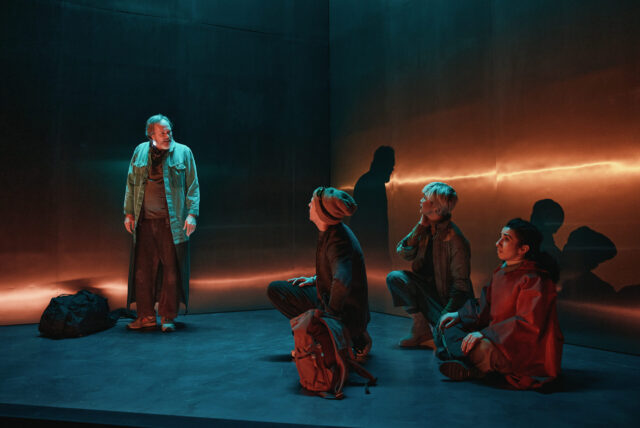
Humankind finds itself at a precipie in prescient new play (photo by Emilio Madrid)
Among the outdated items accumulated at the Museum of Late Human Antiquities are a pen, a rotary phone, a Betamax videocassette, a musical instrument, and a butter churn, pieces of a past that is now long gone. There’s also a ghostlight, a bulb that is placed on stages overnight to ward off troublesome spirits and/or provide light to the theater ghosts who inhabit the space, as if acknowledging that even if humans come to an end, their spirits might still remain. Woman 2 discloses, “So much has been lost, but we have recovered fragments. Scraps of language, abandoned devices. We have endeavored to fill in the gaps; to bring them to life again.”
Filling in some of the gaps, Harrison regularly reminds us that humanity’s time on earth has been squandered by our desperate fear of death, of what might be next, including nothing — and we only have ourselves to blame.
Stuart’s sister confesses to her son, “Everybody dies, baby,” referring to each person. But when Woman 1 promises, “One day you Began, and one day you will End,” she’s talking about the human species as a whole. Our addiction to technology in the pursuit of longevity might very well be our doom, as is already being predicted by many people involved in AI.
But perhaps there’s a glimmer of hope. In the future, a man named Len wonders, “All the while we’ll be getting stronger. We’ll remember the things people used to know, a thousand years ago. The plow. The candle. Probably people will become religious again. They’ll look up in the sky and want to explain a storm. Our kids will grow strong, out in the weather. And all the while, we’ll teach them to hate the inorganics. And eventually, though maybe not in our lifetimes, eventually human beings will rise again. We made the computers and we’ll destroy them.”
Famous last words?
[Mark Rifkin is a Brooklyn-born, Manhattan-based writer and editor; you can follow him on Substack here.]
